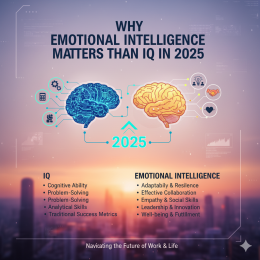
Why Emotional Intelligence Matters More Than IQ in 2025
2025-10-24 16:56:27In a world driven by technology, data, and digital transformation, intelligence is being redefined. Gone are the days when IQ (Intelligence Quotient) alone determined success. Today, EQ- Emotional Intelligence - is emerging as the true foundation of success, happiness, and mental health.
As we step into 2025, emotional intelligence isn't just a "nice-to-have" trait - it's a core life skill that influences our mental well-being, relationships, career growth, and personal fulfilment. Whether you're a student, professional, or leader, understanding and nurturing EQ can transform how you live, think, and connect.
What is Emotional Intelligence (EQ)?
Emotional Intelligence (EQ) refers to your ability to recognize, understand, manage, and express your own emotions, as well as to recognize and influence the emotions of others.
Unlike IQ, which measures logic and reasoning, EQ measures empathy, self- awareness, communication, and emotional control - all essential in maintaining mental balance and building healthy relationships.
According to psychologist Daniel Goleman, EQ has five core components:
Self-Awareness - Understanding your emotions, strengths, and triggers.
Self-Regulation - Managing impulsive reactions, staying calm under pressure.
Motivation - Staying driven and optimistic, even through challenges.
Empathy - Understanding others emotions and responding with compassion.
Social Skills - Building meaningful relationships and communicating effectively.
Together, these skills shape your mental health, emotional stability, and resilience - key elements that define success in 2025.
Why Emotional Intelligence Matters More Than IQ in 2025
1.Artificial Intelligence Can Replace IQ - Not EQ
Machines can calculate faster, analyse data better, and even perform creative tasks. But what they cannot replicate is human emotion.
In the age of AI and automation, what separates us from technology is empathy, compassion, and self-awareness - all pillars of emotional intelligence.
2.Workplaces Value Emotional Skills Over Academic Scores
Modern companies are shifting their hiring priorities. Recruiters are no longer asking just, "What are your skills?" but also, "How do you handle stress, conflict, and teamwork?"
Emotional intelligence drives effective communication, adaptability, and leadership, which are crucial in remote teams and hybrid work environments.
Leaders with high EQ foster trust, reduce burnout, and build motivated teams.
3.EQ Enhances Mental Health and Emotional Balance
People with high EQ are better equipped to deal with anxiety, stress, and emotional burnout.
They know how to identify what they feel, process it, and seek help when needed.
By practicing mindfulness, empathy, and emotional regulation, you reduce the risk of mental exhaustion and depression.
4. Building Resilience in a Fast-Changing World
2025 is an era of uncertainty - from job changes and digital overload to global challenges. People who are emotionally resilient can adapt, recover, and grow stronger after setbacks.
EQ gives you the tools to turn stress into strength, face challenges with optimism, and maintain emotional stability.
5. Emotional Intelligence Improves Relationships
Strong emotional intelligence helps you connect with people authentically. It allows you to listen without judgment, communicate calmly, and resolve conflicts effectively.
Healthy relationships are essential for emotional health, mental clarity, and social well-being - and EQ is the bridge that keeps them strong.
How to Improve Your Emotional Intelligence
Building emotional intelligence takes time, patience, and self-awareness. Here are a few proven ways to develop EQ in your daily life:
Practice Self-Reflection - Spend a few minutes daily identifying your emotions and triggers.
Respond, Don't React - Pause before reacting in anger or stress. Breathe, then respond mindfully.
Develop Empathy - Try to see situations from another person's perspective.
Improve Communication Skills - Speak with clarity, listen deeply, and express emotions respectfully.
Stay Mindful - Engage in meditation or journaling to stay present and emotionally balanced.
Seek Feedback - Ask trusted people how your emotional behaviour affects others.
Emotional Intelligence in Education and Youth Development
Schools and universities are now including emotional intelligence programs to help students manage academic pressure, peer relationships, and digital distractions.
Younger generations with high EQ are more confident, self-aware, and mentally healthy.
Encouraging emotional education early helps reduce stress, bullying, and behavioural issues - creating emotionally stable future leaders.
The Connection Between EQ and Mental Health
Your emotions directly influence your mental health, productivity, and life satisfaction. Emotional intelligence helps:
Lower stress levels
Prevent anxiety and depression
Improve focus and motivation
Strengthen emotional control
Build deeper human connections
In essence, a strong EQ = a stronger mind.
The Future Belongs to Emotionally Intelligent People
As we move into 2025 and beyond, the world needs empathetic leaders, emotionally aware professionals, and mentally strong individuals more than ever.
IQ might help you get the job - but EQ will help you keep it, grow in it, and stay happy while doing it.
It's not just about how smart you are, but how kind, adaptable, and emotionally balanced you can be.
So, start your journey toward emotional growth - because success in 2025 isn't defined by intelligence alone; it's defined by emotional wisdom.
